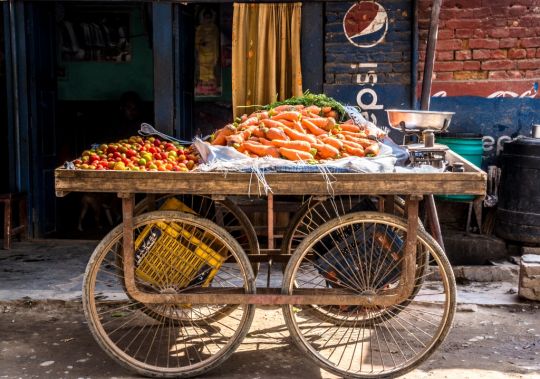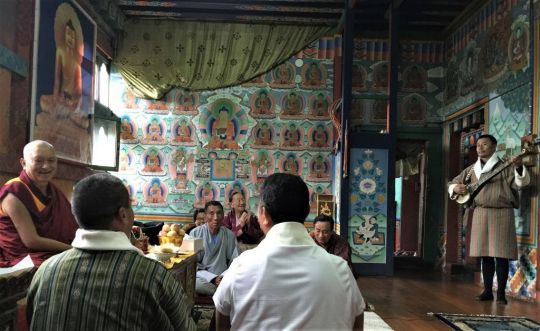- Home
- FPMT Homepage
Foundation for the Preservation of the Mahayana Tradition
The FPMT is an organization devoted to preserving and spreading Mahayana Buddhism worldwide by creating opportunities to listen, reflect, meditate, practice and actualize the unmistaken teachings of the Buddha and based on that experience spreading the Dharma to sentient beings. We provide integrated education through which people’s minds and hearts can be transformed into their highest potential for the benefit of others, inspired by an attitude of universal responsibility and service. We are committed to creating harmonious environments and helping all beings develop their full potential of infinite wisdom and compassion. Our organization is based on the Buddhist tradition of Lama Tsongkhapa of Tibet as taught to us by our founders Lama Thubten Yeshe and Lama Thubten Zopa Rinpoche.
- Willkommen
Die Stiftung zur Erhaltung der Mahayana Tradition (FPMT) ist eine Organisation, die sich weltweit für die Erhaltung und Verbreitung des Mahayana-Buddhismus einsetzt, indem sie Möglichkeiten schafft, den makellosen Lehren des Buddha zuzuhören, über sie zur reflektieren und zu meditieren und auf der Grundlage dieser Erfahrung das Dharma unter den Lebewesen zu verbreiten.
Wir bieten integrierte Schulungswege an, durch denen der Geist und das Herz der Menschen in ihr höchstes Potential verwandelt werden zum Wohl der anderen – inspiriert durch eine Haltung der universellen Verantwortung und dem Wunsch zu dienen. Wir haben uns verpflichtet, harmonische Umgebungen zu schaffen und allen Wesen zu helfen, ihr volles Potenzial unendlicher Weisheit und grenzenlosen Mitgefühls zu verwirklichen.
Unsere Organisation basiert auf der buddhistischen Tradition von Lama Tsongkhapa von Tibet, so wie sie uns von unseren Gründern Lama Thubten Yeshe und Lama Thubten Zopa Rinpoche gelehrt wird.
- Bienvenidos
La Fundación para la preservación de la tradición Mahayana (FPMT) es una organización que se dedica a preservar y difundir el budismo Mahayana en todo el mundo, creando oportunidades para escuchar, reflexionar, meditar, practicar y actualizar las enseñanzas inconfundibles de Buda y en base a esa experiencia difundir el Dharma a los seres.
Proporcionamos una educación integrada a través de la cual las mentes y los corazones de las personas se pueden transformar en su mayor potencial para el beneficio de los demás, inspirados por una actitud de responsabilidad y servicio universales. Estamos comprometidos a crear ambientes armoniosos y ayudar a todos los seres a desarrollar todo su potencial de infinita sabiduría y compasión.
Nuestra organización se basa en la tradición budista de Lama Tsongkhapa del Tíbet como nos lo enseñaron nuestros fundadores Lama Thubten Yeshe y Lama Zopa Rinpoche.
A continuación puede ver una lista de los centros y sus páginas web en su lengua preferida.
- Bienvenue
L’organisation de la FPMT a pour vocation la préservation et la diffusion du bouddhisme du mahayana dans le monde entier. Elle offre l’opportunité d’écouter, de réfléchir, de méditer, de pratiquer et de réaliser les enseignements excellents du Bouddha, pour ensuite transmettre le Dharma à tous les êtres. Nous proposons une formation intégrée grâce à laquelle le cœur et l’esprit de chacun peuvent accomplir leur potentiel le plus élevé pour le bien d’autrui, inspirés par le sens du service et une responsabilité universelle. Nous nous engageons à créer un environnement harmonieux et à aider tous les êtres à épanouir leur potentiel illimité de compassion et de sagesse. Notre organisation s’appuie sur la tradition guéloukpa de Lama Tsongkhapa du Tibet, telle qu’elle a été enseignée par nos fondateurs Lama Thoubtèn Yéshé et Lama Zopa Rinpoché.
Visitez le site de notre Editions Mahayana pour les traductions, conseils et nouvelles du Bureau international en français.
Voici une liste de centres et de leurs sites dans votre langue préférée
- Benvenuto
L’FPMT è un organizzazione il cui scopo è preservare e diffondere il Buddhismo Mahayana nel mondo, creando occasioni di ascolto, riflessione, meditazione e pratica dei perfetti insegnamenti del Buddha, al fine di attualizzare e diffondere il Dharma fra tutti gli esseri senzienti.
Offriamo un’educazione integrata, che può trasformare la mente e i cuori delle persone nel loro massimo potenziale, per il beneficio di tutti gli esseri, ispirati da un’attitudine di responsabilità universale e di servizio.
Il nostro obiettivo è quello di creare contesti armoniosi e aiutare tutti gli esseri a sviluppare in modo completo le proprie potenzialità di infinita saggezza e compassione.
La nostra organizzazione si basa sulla tradizione buddhista di Lama Tsongkhapa del Tibet, così come ci è stata insegnata dai nostri fondatori Lama Thubten Yeshe e Lama Zopa Rinpoche.
Di seguito potete trovare un elenco dei centri e dei loro siti nella lingua da voi prescelta.
- 欢迎 / 歡迎
简体中文
“护持大乘法脉基金会”( 英文简称:FPMT。全名:Foundation for the Preservation of the Mahayana Tradition) 是一个致力于护持和弘扬大乘佛法的国际佛教组织。我们提供听闻,思维,禅修,修行和实证佛陀无误教法的机会,以便让一切众生都能够享受佛法的指引和滋润。
我们全力创造和谐融洽的环境, 为人们提供解行并重的完整佛法教育,以便启发内在的环宇悲心及责任心,并开发内心所蕴藏的巨大潜能 — 无限的智慧与悲心 — 以便利益和服务一切有情。
FPMT的创办人是图腾耶喜喇嘛和喇嘛梭巴仁波切。我们所修习的是由两位上师所教导的,西藏喀巴大师的佛法传承。
繁體中文
護持大乘法脈基金會”( 英文簡稱:FPMT。全名:Found
ation for the Preservation of the Mahayana Tradition ) 是一個致力於護持和弘揚大乘佛法的國際佛教組織。我們提供聽聞, 思維,禪修,修行和實證佛陀無誤教法的機會,以便讓一切眾生都能 夠享受佛法的指引和滋潤。 我們全力創造和諧融洽的環境,
為人們提供解行並重的完整佛法教育,以便啟發內在的環宇悲心及責 任心,並開發內心所蘊藏的巨大潛能 — 無限的智慧與悲心 – – 以便利益和服務一切有情。 FPMT的創辦人是圖騰耶喜喇嘛和喇嘛梭巴仁波切。
我們所修習的是由兩位上師所教導的,西藏喀巴大師的佛法傳承。 察看道场信息:
- FPMT Homepage
- News/Media
-
- Study & Practice
-
-
- About FPMT Education Services
- Latest News
- Programs
- New to Buddhism?
- Buddhist Mind Science: Activating Your Potential
- Heart Advice for Death and Dying
- Discovering Buddhism
- Living in the Path
- Exploring Buddhism
- FPMT Basic Program
- FPMT Masters Program
- FPMT In-Depth Meditation Training
- Maitripa College
- Lotsawa Rinchen Zangpo Translator Program
- Universal Education for Compassion & Wisdom
- Online Learning Center
-
- Prayers & Practice Materials
- Overview of Prayers & Practices
- Full Catalogue of Prayers & Practice Materials
- Explore Popular Topics
- Benefiting Animals
- Chenrezig Resources
- Death & Dying Resources
- Lama Chopa (Guru Puja)
- Lama Zopa Rinpoche: Compendium of Precious Instructions
- Lama Zopa Rinpoche: Life Practice Advice
- Lama Zopa Rinpoche Practice Series
- Lamrim Resources
- Mantras
- Prayer Book Updates
- Purification Practices
- Sutras
- Thought Transformation (Lojong)
- Audio Materials
- Dharma Dates - Tibetan Calendar
- Translation Services
- Publishing Services
- Ways to Offer Support
- Prayers & Practice Materials
-
- Teachings and Advice
- Find Teachings and Advice
- Lama Zopa Rinpoche Advice Page
- Lama Zopa Rinpoche: Compendium of Precious Instructions
- Lama Zopa Rinpoche Video Teachings
- ༧སྐྱབས་རྗེ་བཟོད་པ་རིན་པོ་ཆེ་མཆོག་ནས་སྩལ་བའི་བཀའ་སློབ་བརྙན་འཕྲིན།
- Podcasts
- Lama Yeshe Wisdom Archive
- Buddhism FAQ
- Dharma for Young People
- Resources on Holy Objects
- Teachings and Advice
-
-
*If a menu item has a submenu clicking once will expand the menu clicking twice will open the page.
-
-
- Centers
-
- Teachers
-
- Projects
-
-
-
-
*If a menu item has a submenu clicking once will expand the menu clicking twice will open the page.
-
-
- FPMT
-
-
-
-
-
Like molding dough in your hand, you can definitely turn your mind whichever way you want.
Lama Zopa Rinpoche
-
-
-
- Shop
-
-
-
The Foundation Store is FPMT’s online shop and features a vast selection of Buddhist study and practice materials written or recommended by our lineage gurus. These items include homestudy programs, prayers and practices in PDF or eBook format, materials for children, and other resources to support practitioners.
Items displayed in the shop are made available for Dharma practice and educational purposes, and never for the purpose of profiting from their sale. Please read FPMT Foundation Store Policy Regarding Dharma Items for more information.
-
-
Lama Zopa Rinpoche News and Advice
1
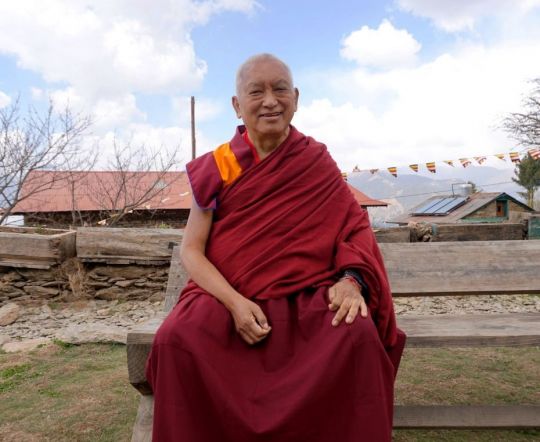
Lama Zopa Rinpoche in front of Thubten Shedrup Ling Monastery, Chailsa, Nepal, March 2017. Photo by Ven. Lobsang Sherab.
In March 2017, Lama Zopa Rinpoche visited the village of Chailsa, in Solu Khumbu, Nepal. Among various activities there, he visited Sagarmatha Secondary School. More than two years ago, FPMT took on the commitment of sponsoring this school, which has about 120 students, with its Social Service Fund. Kopan Monastery oversees the management of the school.
Chailsa is in Solu Khumbu, north-eastern Nepal, the district where Lama Zopa Rinpoche was born and where many Himayalan Buddhists live. Chailsa is in the southern part of the district near Salleri, the district headquarters. The area is remote but still reachable by jeep—a day-long drive from Kathmandu over difficult roads.
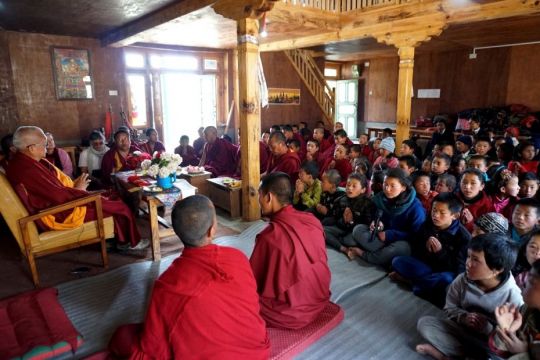
Lama Zopa Rinpoche explains how to do water bowl offerings to the children of Sagarmatha school. Chailsa, Nepal, March 2017. Photo by Ven. Lobsang Sherab.
Rinpoche blessed the school and was welcomed by the children with a traditional dance. He gave a talk to them, giving them an explanation of how to do water bowls. He also sponsored a picnic for the children and their teachers. The school provided prizes for the children’s exams, which Rinpoche handed out. Rinpoche and Kopan are working to identify the needs of the schoolchildren so they can ensure that the necessary donations are organized.
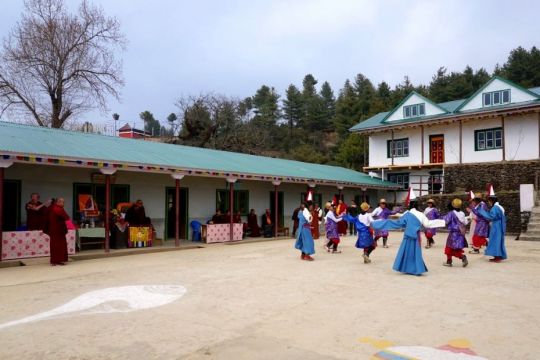
Schoolchildren offering Lama Zopa Rinpoche a traditional dance. Chailsa, Nepal, March 2017. Photo by Ven. Lobsang Sherab.
In the village, Rinpoche gave a lung and some commentary for the Vajrayogini three-year retreat privately to some students, one who is planning to soon do the retreat. He also gave a short commentary to the local gompa keeper of the torma gyatsa practice. Finally, he offered an Amitabha long life initiation with teachings.
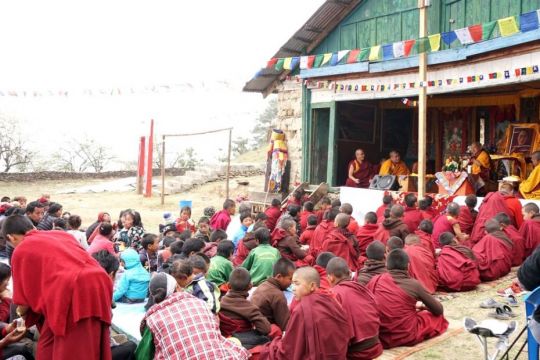
Lama Zopa Rinpoche offering an Amitabha long life initiation, Chailsa, Nepal, March 2017. Photo by Ven. Lobsang Sherab.
Rinpoche also visited Thubten Shedrup Ling. This monastery, located in Chailsa, is under the care of Kopan Monastery, which took it over in 2004. It has only a few dozen residents, and with the help of Kopan, it has been partially rebuilt. It offers an opportunity for young people to receive a monastic education, to live in their vows in a monastic environment, and study and practice the teachings of the Buddha.
Rinpoche is also trying to locate land in Chailsa on which to keep goats and other animals whose lives have been saved.
On the trip, Rinpoche also went to Thubten Chöling, a large monastery built by the late Trulshik Rinpoche in the 1960s in Junbesi, which is near Salleri and on the Jiri-Everest trekking trail.
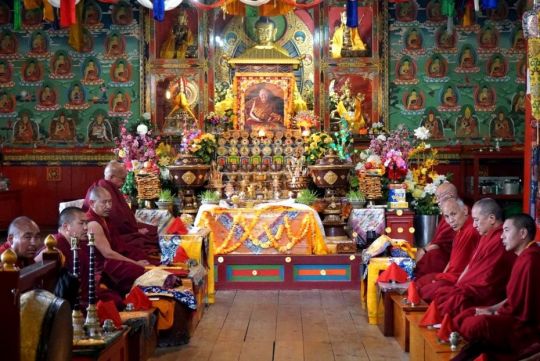
Lama Zopa Rinpoche with the monks and nuns of Thupten Chöling Monastery doing prayers in front of the Holy Body of Trulshik Rinpoche. Solu Khumbu, Nepal, March 2017. Photo by Ven. Lobsang Sherab.
One of the greatest living masters of the Nyingma and rime traditions of Tibetan Buddhism, Trulshik Rinpoche, who passed away in 2011, was one of Rinpoche’s gurus. While at Thubten Chöling, Rinpoche offered to sponsor a portion of the costs of a stupa being constructed there. He paid his respects to Trulshik Rinpoche’s holy body (which is in a mandala house above the altar), made prayers, and made offerings to each of the approximately 400 Sangha present. Rinpoche’s assistant, Ven.Roger, requested the Sangha to do an extensive Medicine Buddha puja for Rinpoche’s health and long life, following the advice of Khadro-la (Rangjung Neljorma Khadro Namsel Drönme).
Lama Zopa Rinpoche is the spiritual director of the Foundation for the Preservation of Mahayana Tradition (FPMT), a Tibetan Buddhist organization dedicated to the transmission of the Mahayana Buddhist tradition and values worldwide through teaching, meditation, and community service.
26
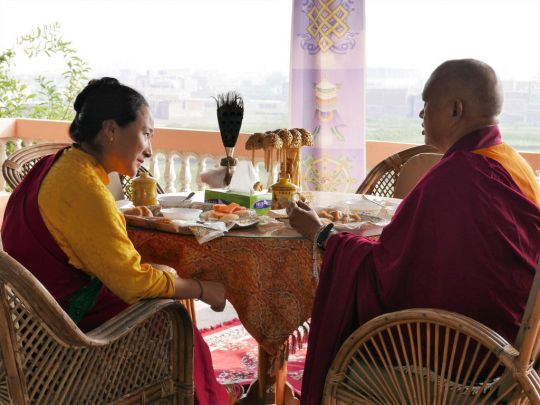
Lama Zopa Rinpoche and Khadro-la (Rangjung Neljorma Khadro Namsel Drönme) enjoy a vegetarian meal at Root Institute in Bodhgaya, India, January 2017. Photo by Ven. Roger Kunsang.
Lama Zopa Rinpoche cares deeply about animals and uses every possible opportunity to bless them with prayers, mantras, holy objects, and other means. A short video of Lama Zopa Rinpoche blessing sentient beings in a lake in Washington State, US, appears below.
Rinpoche also avoids eating other living beings. He is a vegetarian and often urges his students not to eat meat. He gave the following advice in 2014.
Rinpoche said, “About meat, I would like to say, please reduce eating meat, as it does so much harm to others and even to one’s own body. This is not just belief, it’s now even accepted scientifically. If you can avoid meat, it’s so good. Wow, wow, wow!”
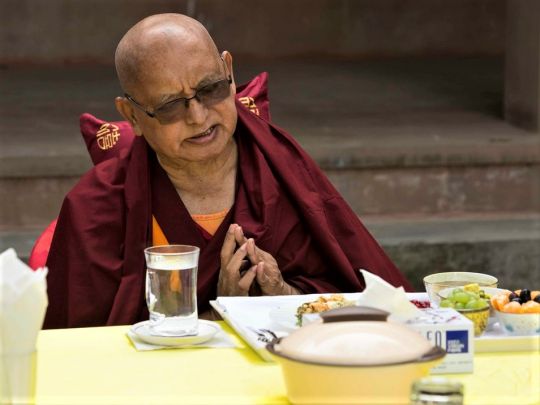
Rinpoche blessing the vegetarian lunch offered to all after his long life puja in Sarnath, India, January 2017. Photo by Paolo Regis.
Rinpoche focused on avoiding meat as the most compassionate approach, saying, “All the buddhas and bodhisattvas will be so happy with you, just as a mother loves her beloved child, cherishing her child so much. When her child does something good that makes the mother so unbelievable happy. So if possible, abandon meat or cut down eating meat. The conclusion is that if less people eat meat, that means more animals won’t suffer from being killed. That’s the benefit, so please think about this.”
Rinpoche also advised considering carefully the teachings of the lamrim. “Don’t think about the pleasure of eating [meat] without thinking about reincarnation, karma, and the lower realms. Instead of just thinking about the pleasure of eating meat, think about the suffering of the animals when they are being killed, and think of yourself being at the butcher’s place, about to be killed. How does that feel? If you’re about to be killed, like the animals, how does that feel? Do you like that? If you really think Dharma is to not harm sentient beings, then don’t eat meat, or at least eat very little.”
Rinpoche added that one can remain healthy without meat, explaining, “Not eating meat is OK. So many young people in the West don’t eat meat and are still healthy; they can supplement their diet with other things. So many people [are vegetarian] now, young and old, and its increasing more and more.”
Watch Rinpoche bless living beings in Omak Lake in Washington State, US, on YouTube:
https://youtu.be/zoFxyLZPUiQ
Lama Zopa Rinpoche is the spiritual director of the Foundation for the Preservation of Mahayana Tradition (FPMT), a Tibetan Buddhist organization dedicated to the transmission of the Mahayana Buddhist tradition and values worldwide through teaching, meditation, and community service.
- Tagged: animals, compassion, lama zopa rinpoche, lama zopa rinpoche video short, vegetarianism, video
24
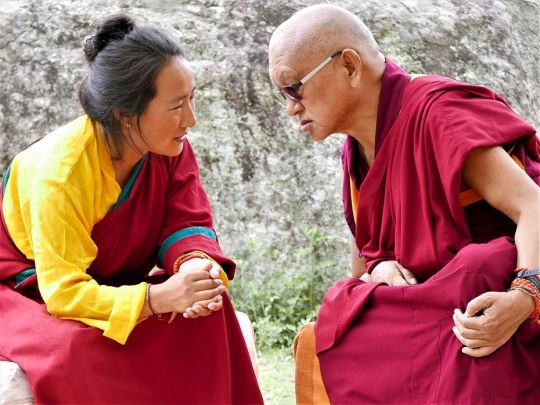
Khadro-la (Rangjung Neljorma Khadro Namsel Drönme) with Lama Zopa Rinpoche, Bhutan, May 2016. Photo by Ven. Roger Kunsang.
During a road trip from Washington State to California in November 2016, Lama Zopa Rinpoche chanted a guru devotion prayer along with a CD that was playing in the car. See the video of him chanting below.
Rinpoche frequently speaks about the importance of guru devotion. In his book The Heart of the Path, he explains the real meaning of “guru.”
“When we think about what guru really means,” says Rinpoche, “we have to think about the absolute guru. We have to go beyond the conventional guru to the absolute guru, the real meaning of guru. And what is the absolute guru?” Rinpoche answers, “It is the dharmakaya, the transcendental wisdom of nondual bliss and voidness. It is eternal, with no beginning and no end … This dharmakaya pervades all existence; there’s no place that the dharmakaya, the holy mind of the buddhas, does not cover.”
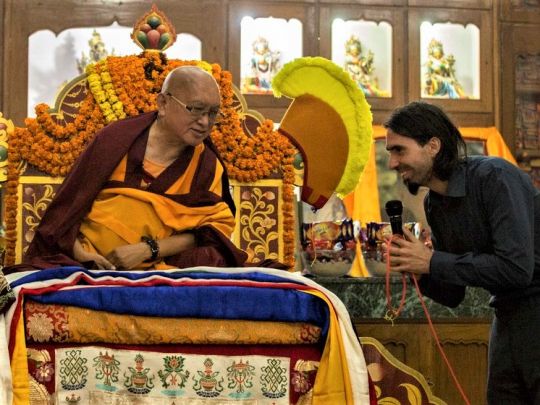
Tenzin Ösel Hita giving a spontaneous speech requesting Lama Zopa Rinpoche to have a long life, at a long life puja offered to Rinpoche at the Tara Temple, Bodhgaya, India, January 2017. Photo by Paolo Regis.
Rinpoche goes on to quote the text Ornament of Mahayana Sutras (Skt: Mahayanasutralankara), by Maitreya Buddha, who writes:
Just as the innumerable beams of the sun mix to perform the one activity of illuminating the world, in the uncontaminated sphere of dharmakaya the innumerable buddhas mix to perform the one activity of illuminating with transcendental wisdom.
Rinpoche explains the quote, saying, “In the dharmakaya the countless buddhas mix to perform the one action of guiding sentient beings, of making the transcendental wisdom of omniscient mind appear in the minds of sentient beings.The dharmakaya, the absolute guru, is the completely pure holy mind … When sunlight dispels eternal darkness, we see objects clearly. When the buddhas dispel our inner darkness, our minds are completely illuminated.”
“It is helpful,” Rinpoche concludes, “to remember this quotation from Maitreya Buddha when we begin each session of guru yoga practice.”
Watch Lama Zopa Rinpoche chant a guru devotion prayer on YouTube:
https://youtu.be/h4UQ_QtJDzk
Read the full teaching in chapter 19 of The Heart of the Path by Lama Zopa Rinpoche. Purchase the book from the Foundation Store and support FPMT’s International Office and its Dharma activities.
Hard copy: https://shop.fpmt.org/Heart-of-the-Path–Hard-Copy_p_814.html
Ebook: https://shop.fpmt.org/Heart-of-the-Path-eBook_p_2360.html
Lama Zopa Rinpoche is the spiritual director of the Foundation for the Preservation of Mahayana Tradition (FPMT), a Tibetan Buddhist organization dedicated to the transmission of the Mahayana Buddhist tradition and values worldwide through teaching, meditation and community service.
- Tagged: guru devotion, Heart of the Path, khandro kunga bhuma, lama zopa rinpoche, lama zopa rinpoche video short, tenzin osel hita, video
19
Dharma in the City

Lama Zopa Rinpoche in New York City, US, 2016. Photo by Ven. Roger Kunsang.
Do we have to go to a retreat center or a faraway country to really meditate?
Way back in 1979, Lama Zopa Rinpoche responded to this question with a teaching on how to practice Dharma in the city.
Rinpoche said, “We don’t have to live in a hermitage in order to generate the realizations of the steps of the path … The whole thing is mind, so whether we are in the city or in the country, or while we are working, there is a way to gradually generate the realizations of the steps of the path to enlightenment.”
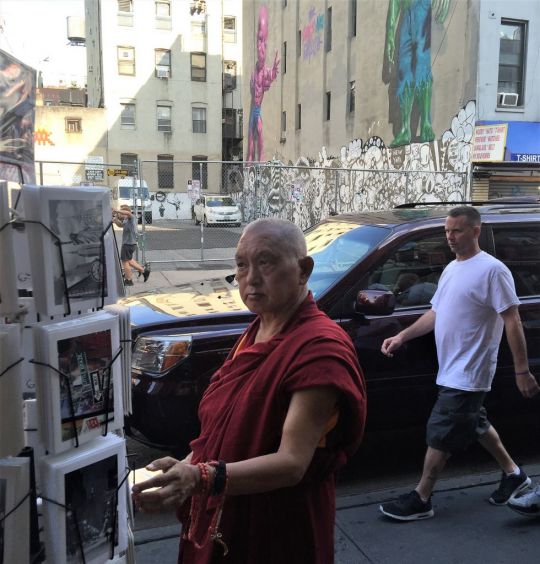
Lama Zopa Rinpoche in New York City, US, 2016. Photo by Ven. Roger Kunsang.
Rinpoche explained, “Each day, while we are working, living with our family, living in the city, we can leave impressions of the stages of the path to enlightenment in our mind, by making sessions of one hour or half an hour each day, similar to those who live in the hermitage … Do some sessions in the morning or evening, then in the daytime, in the break times, be aware—constantly watch the mind; watch the actions of the body, speech, and mind. As much as possible practice lamrim in the break times, and by watching the mind we know what action the body is doing, what action the speech is doing, what action the mind is doing, we are able to recognize. Then also we find out when delusion is arising or not arising; we recognize whatever the delusion is and when it is about to arise. While it is arising, remember the teachings and the different meditations, and apply them …
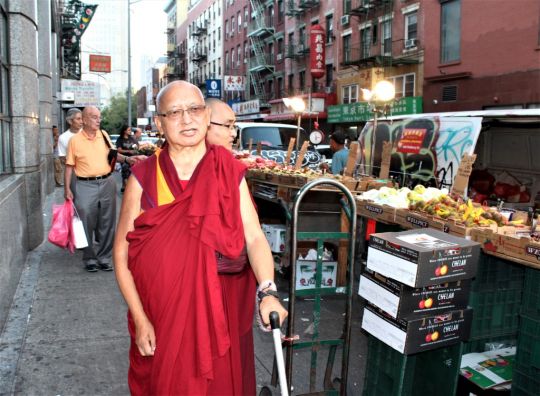
Lama Zopa Rinpoche walking in New York City, US, July 2016. Photo by Nan Meng.
“Try to remember bodhichitta and practice bodhichitta … Whatever activity we are doing, try to relate it to the practice of bodhichitta. If our daily activities are not possessed by attachment, clinging to the happiness of this life; if we watch the mind and control the unsubdued mind with the meditation techniques, then the motivation is not possessed by the attachment clinging to the happiness of this life and all our actions become Dharma, the cause of happiness.”
Rinpoche concluded, “Then as we remember bodhichitta, as we relate with the practice of bodhichitta, any activity that we do with the practice of bodhichitta—all our work in the factories, on the ships, or in business—becomes the cause to achieve enlightenment. If our activities are done with the motivation of bodhichitta, they become the bodhisattva’s practice. So even if we live far away from the guru—in the city or with our family—there is a possibility of doing this.”
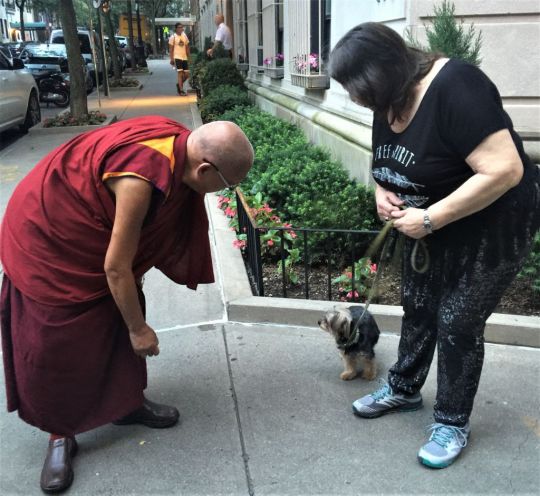
Lama Zopa Rinpoche blessing a dog on a city street, New York City, US, 2016. Photo by Ven. Roger Kunsang.
Find the original teaching here:
https://www.lamayeshe.com/article/practicing-lam-rim-householder
Lama Zopa Rinpoche is the spiritual director of the Foundation for the Preservation of Mahayana Tradition (FPMT), a Tibetan Buddhist organization dedicated to the transmission of the Mahayana Buddhist tradition and values worldwide through teaching, meditation and community service.
- Tagged: bodhichitta, city, lama zopa rinpoche, lamrim, mind training
17
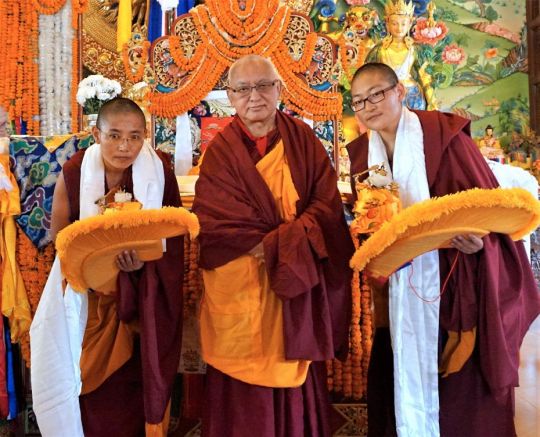
Lama Zopa Rinpoche with Geshes Namdrol Phuntsok and Jangchub Gyalmo, Kopan Nunnery, Nepal, November 2016. Photo by Ven. Lobsang Sherab.
Kopan Nunnery has its first two geshemas. They are Geshe Namdrol Phuntsok and Geshe Jangchub Gyalmo, who graduated with their Geshe degrees in 2016 after an intense program lasting more than twenty years. Lama Zopa Rinpoche met with them in November 2016 at Kopan Nunnery to congratulate them—and to watch them debate philosophy, a skill they honed during their years of study (see video below).
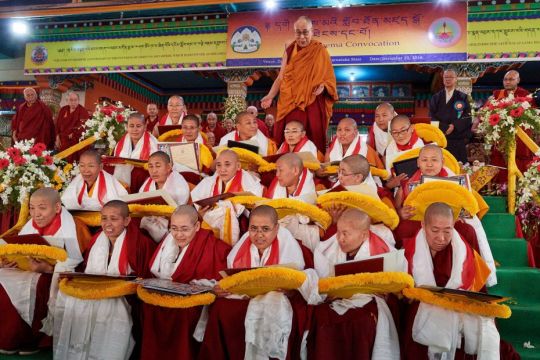
His Holiness the Dalai Lama with the first Himalayan geshemas at their graduation ceremony, Drepung Monastery, India, December 2016. Photo by Olivier Adam.
While many people have commented on the great benefits the geshemas will bring to others by teaching and mentoring, what benefits will their studies bring to them?
In a letter sent to a student in 2014 on the merit of in-depth Dharma study, Lama Zopa Rinpoche pointed out that those who follow their guru’s advice to undertake serious study create tremendous merit. Speaking directly to such students, he stated that this merit “means unbelievable, most unbelievable imprints are left on your mind. It means even if you don’t actualize the path in this life, because of doing this study and purifying so much, in the next life you will meet the Buddha’s teachings and be able to learn, because you have purified so much past negative karma and obscurations. This helps to achieve a higher rebirth, a perfect human rebirth, to meet the Dharma again and to become so expert and through that to have realizations through practicing, and not only that, to be able to go to nirvana and to enlightenment. That is so great!”
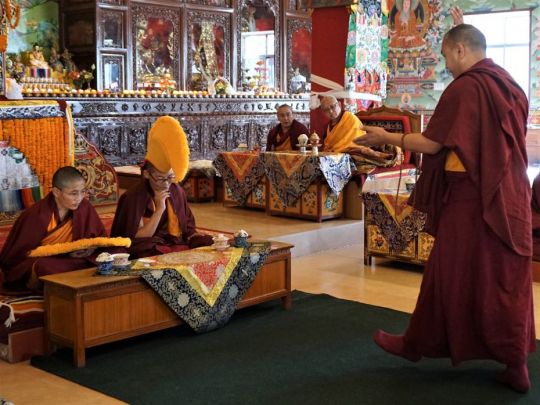
Watched by Lama Zopa Rinpoche, Geshes Namdrol Phuntsok and Jangchub Gyalmo debate a monk at Kopan Nunnery, Nepal, November 2016. Photo by Ven. Lobsang Sherab.
Rinpoche continued, saying, “That means each time we are studying, we are fulfilling our Guru’s wishes, so we are becoming closer to enlightenment each time. We become closer to being free from samsara, and closer to enlightenment. So this is what has been happening all these years that you have been studying, doing homework, attending classes, these are the benefits of that. So you have gained unbelievably, so much … Therefore you should rejoice, it is most unbelievable, your whole life should be filled with incredible joy and happiness.”
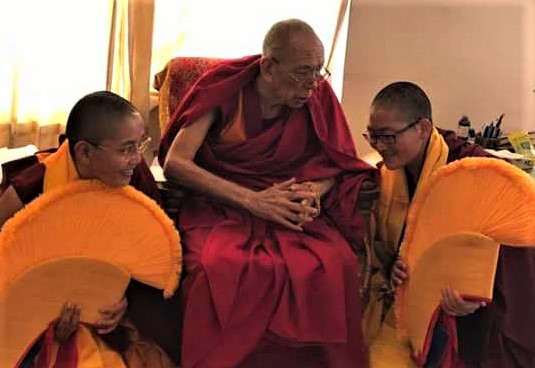
Kopan Nunnery’s two new geshemas with Rizong Rinpoche, former Ganden Tripa, Nepal, November 2016. Photo by Mukhiya Ghale.
“Among all the sentient beings,” Rinpoche concluded, “the amount of people who are Buddhists is so small. Then from those who are Buddhist, those who have the opportunity to study are very rare. Then to be able to find a qualified teacher who can teach philosophy, it’s so, so rare. So you can rejoice, it’s unbelievable.”
Join Lama Zopa Rinpoche in rejoicing at the graduation of the geshemas. Watch them debate in front of Rinpoche and Rizong Rinpoche, former Ganden Tripa (head of the Gelug school of Tibetan Buddhism), at Kopan Nunnery, Nepal, in November 2016:
https://www.youtube.com/watch?v=SexrtqnobdM&feature=youtu.be
Lama Zopa Rinpoche is the spiritual director of the Foundation for the Preservation of Mahayana Tradition (FPMT), a Tibetan Buddhist organization dedicated to the transmission of the Mahayana Buddhist tradition and values worldwide through teaching, meditation, and community service.
14
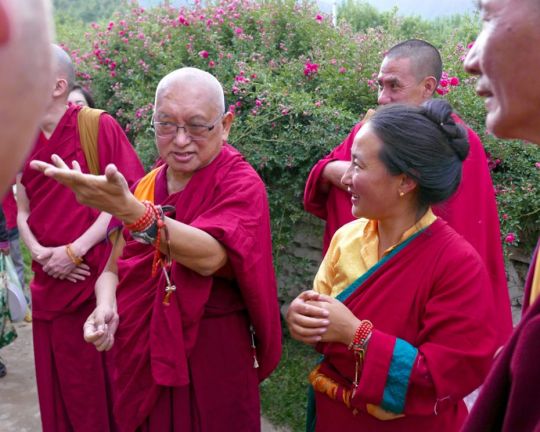
Lama Zopa Rinpoche with Khadro-la (Rangjung Neljorma Khadro Namsel Drönme) in Bhutan, May 2016. Photo by Ven. Roger Kunsang.
Every year Ven. Roger Kunsang, on behalf of the FPMT organization, checks with one of Lama Zopa Rinpoche’s gurus or Khadro-la (Rangjung Neljorma Khadro Namsel Drönme) to determine what practices should be done to help create the conditions for Lama Zopa Rinpoche to have good health for the coming year. Khadro-la has recently advised that some prayers need to be recited, together with the completion of a number of pujas.
The prayers Khadro-la advised are the Vajra Cutter Sutra and the Dependent Arising: A Praise of the Buddha (Tendrel Topa).
We are requesting everyone to join in and keep track of their recitations of these prayers during the rest of this Tibetan year! At the end of the Tibetan year (i.e., just before Losar 2018) we will ask everyone to send us the number of prayers recited and will offer the total number of accumulated recitations to Rinpoche. It would be very beneficial if all FPMT centers, projects, services, and study groups can arrange regular recitations of these prayers.
Please use the following dedication (ideally, in addition to the usual FPMT dedication prayers):
For Kyabje Lama Zopa Rinpoche to always have perfect health and to always be free of obstacles; and for all Rinpoche’s Dharma projects around the world to be highly successful, including all FPMT centers, projects, and services.
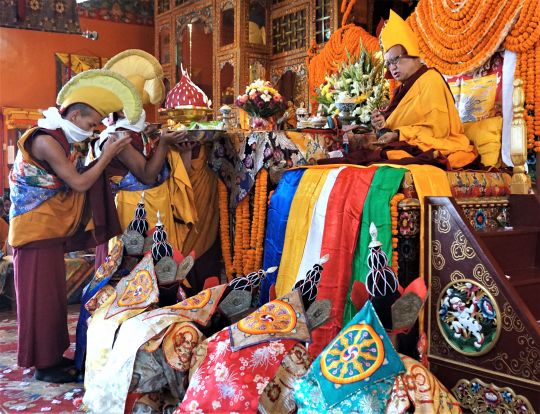
Offering tsog at the long life puja for Lama Zopa Rinpoche on the last day of the Kopan November course. The five dakinis are also shown. Kopan Monastery, Nepal, December 2016. Photo by Ven. Lobsang Sherab.
The pujas advised by Khadro-la will be offered in a number of monasteries every month until the end of this Tibetan year. Any contributions to help cover the costs of the pujas will be greatly appreciated. Donations can be made to the FPMT Puja Fund.
In addition, there will be an extensive long life puja offered to Lama Zopa Rinpoche at Kopan Monastery, Nepal, on April 23, 2017. Everyone is welcome to attend!
Lama Zopa Rinpoche is the spiritual director of the Foundation for the Preservation of Mahayana Tradition (FPMT), a Tibetan Buddhist organization dedicated to the transmission of the Mahayana Buddhist tradition and values worldwide through teaching, meditation and community service.
12
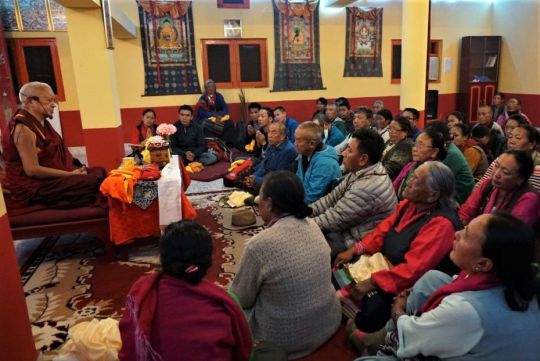
Lama Zopa Rinpoche giving teachings to a group of Sherpas at Root Institute, Bodhgaya, India, January 2017. Photo by Ven. Lobsang Sherab.
Lama Zopa Rinpoche gave a wonderful teaching on the Seven-Point Mind Training (also called Seven-Point Thought Transformation) on February 5, 2017, at Root Institute in Bodhgaya, India. The mind training (Tibetan: lojong) text Rinpoche taught was by Kadampa Geshe Chekawa.
A video of this three-hour teaching appears below. It can also be found on Rinpoche Available Now, FPMT’s website of Lama Zopa Rinpoche’s latest teachings online.
Rinpoche taught Geshe Chekawa’s well-known text by following a verse commentary on it by Lama Tsongkhapa, entitled in English as Mind Training in Ornamental Words or Twenty-Seven Verses on Mind Training.
At a long life puja offered to him last year in Singapore, all FPMT centers requested Rinpoche to teach lojong, on the advice of Khadro-la (Rangjung Neljorma Khadro Namsel Drönme). She had indicated that giving this particular teaching would help ensure Lama Zopa Rinpoche’s long life.
Watch Rinpoche teaching the Seven-Point Mind Training on YouTube:
https://youtu.be/Jbf0ZcNLZmM
See more videos of teachings by Lama Zopa Rinpoche at Root Institute in 2017 at Rinpoche Available Now:
https://fpmt.org/media/
Get a free PDF of Geshe Chekawa’s mind training text through the Foundation Store:
https://shop.fpmt.org/The-Seven-Point-Thought-Transformation-PDF_p_3542.html
Lama Zopa Rinpoche is the spiritual director of the Foundation for the Preservation of Mahayana Tradition (FPMT), a Tibetan Buddhist organization dedicated to the transmission of the Mahayana Buddhist tradition and values worldwide through teaching, meditation and community service.
- Tagged: bodhgaya, essential extract, kadampa teachings, lama zopa rinpoche, lo-jong, mind training, video
10
Feed the Birds
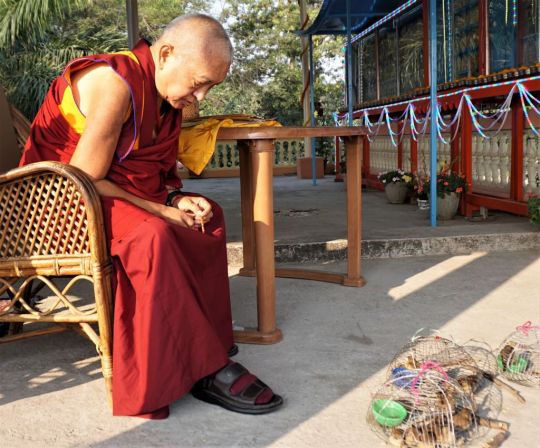
Lama Zopa Rinpoche blessing birds in Bodhgaya, India, January 2017. Photo by Ven. Lobsang Sherab. The birds are released from the cages after being blessed.
In 2007, Lama Zopa Rinpoche talked about the benefits of feeding birds, saying, “When we give food to birds we should chant the Mitukpa, Medicine Buddha, Chenrezig, and the five powerful mantras and then blow over the food. Giving food to birds protects them from hunger and thirst. The most important benefit is that it purifies negative karma and defilements. It helps them to not be born in the lower realms, by purifying them. It blesses their minds. By giving food in this way, it becomes a practice of loving kindness, of giving material things, and of giving fearlessness and purifying negative karma. There is so much suffering and fear in the lower realms and this is a way to protect them from it.”
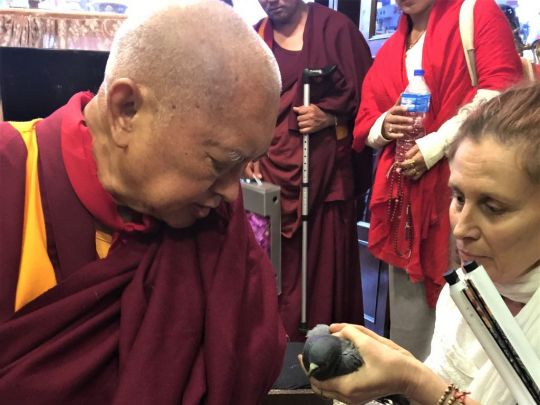
Lama Zopa Rinpoche recites mantras for an injured bird, Kopan Monastery, Nepal, December 2016. Photo by Ven. Roger Kunsang.
Rinpoche continued. “Feeding the birds and the other animals doesn’t have to be done for one’s own pleasure but can instead be a sincere practice of giving … You are offering fearlessness by saying mantras and then blowing on the food or water. This is morality working for sentient beings—giving sentient beings what they need. Giving food and water is material generosity. When mantras are said and blown upon the food and water it becomes the charity of fearlessness, and when you play the mantras so that the animals can hear them it becomes the charity of Dharma.”
Read the complete teaching here:
https://www.lamayeshe.com/advice/protecting-and-feeding-birds
See more information and a video on How to Benefit the Bodies and Minds of Birds here:
https://fpmt.org/lama-zopa-rinpoche-news-and-advice/lama-zopa-rinpoche-news/how-to-benefit-the-bodies-and-minds-of-birds-video/
Lama Zopa Rinpoche is the spiritual director of the Foundation for the Preservation of Mahayana Tradition (FPMT), a Tibetan Buddhist organization dedicated to the transmission of the Mahayana Buddhist tradition and values worldwide through teaching, meditation and community service.
- Tagged: animals, birds, lama zopa rinpoche
5
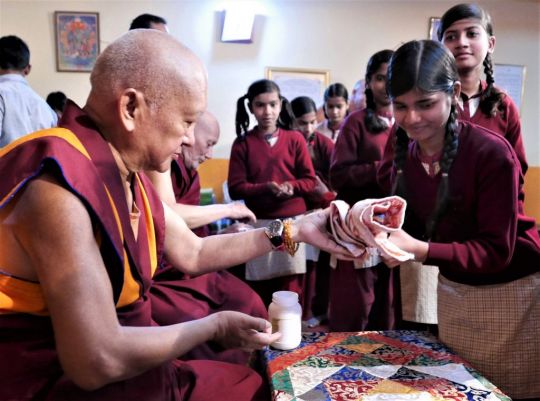
Lama Zopa Rinpoche offers gifts to children at FPMT’s Maitreya School, Bodhgaya, India, January 2017. Photo by Ven. Roger Kunsang.
Lama Zopa Rinpoche cares deeply about children. Indeed, his Vast Visions include a focus on young people. What does Rinpoche say about children and youth?
Rinpoche has commented, “[FPMT should] help young people through meditation and consultation, and also help them offer volunteer service as part of their practice. This brings immediate benefit.”
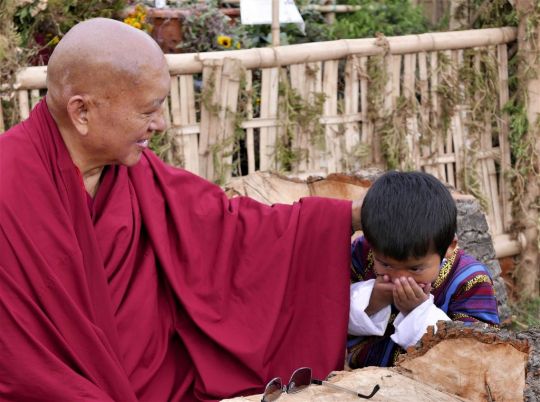
Lama Zopa Rinpoche blesses a small boy who covers his mouth to show respect, Bhutan, June 2016. Photo by Ven. Roger Kunsang.
Rinpoche has also explained his thoughts on raising children: “The best way to take care of children is to think of them simply as a sentient being rather than as my child. For example, when you generate bodhichitta for all sentient beings … it goes without saying that you [include] your own children … If you think in this way, you will have the same motivation to care for your children as you would any sentient being … So when you begin a practice with the motivation of bodhichitta, the thought to achieve enlightenment for all sentient beings, recall that your child is one of those sentient beings and do the practice with that awareness. Similarly, when you conclude a practice with the dedication to achieve enlightenment for the sake of all sentient beings, remember that your child is one of those sentient beings …”
Rinpoche adds, “Because you, as a parent, have a particular karmic connection with and are responsible for the specific sentient beings that are your children, you should always pay special attention to the fact that your children are included among those sentient beings. By thinking in this way, you will have a totally different attitude toward your children; there will not be the slightest negative thought caused by the eight worldly concerns, and instead you will take care of them motivated by the positive thought of cherishing a sentient being.”
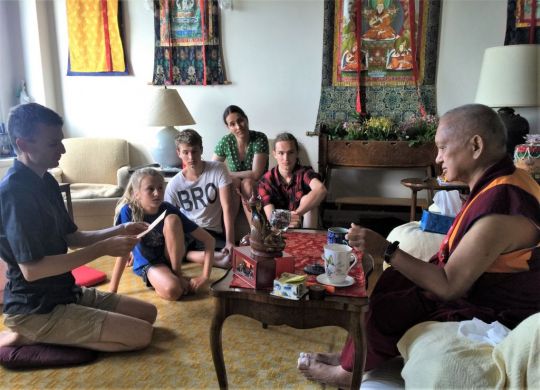
Lama Zopa Rinpoche visits with young people in New York City, USA, 2016. Photo by Ven. Roger Kunsang.
“On the other hand,” he continues, “if you allow yourself to come under the influence of the eight worldly concerns, when your children do something to please you, something that you like, you will happily take care of them. However, when they do something that is contrary to your wishes, something that upsets you or makes you angry, you may even be tempted to give them up entirely. This change in your attitude towards them happens because you are attached to your own happiness and want to avoid suffering and problems. With bodhichitta, you feel that your children are the most precious and the kindest beings in your life. If you have this attitude, you will take care of them with a healthy positive mind rather than with a negative emotional mind and the pain of attachment.
“As a parent, you can make yourself happy by thinking:
How wonderful that my life can be beneficial for even one sentient being.
How wonderful that I can take care of even one sentient being.
How wonderful that my limbs can be useful for looking after and bringing happiness to even one sentient being.
“Especially when you encounter difficulties—when your children do not listen to you, when you cannot control them and when you feel disappointed with them—it is good to rejoice in these ways.”
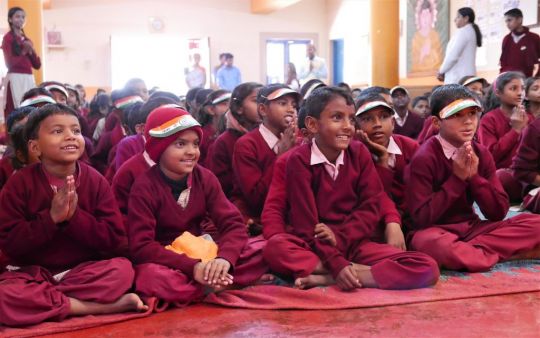
Children at FPMT’s Maitreya School in Bodhgaya, India, listen to Lama Zopa Rinpoche, January 2017. Photo by Ven. Roger Kunsang.
In 2013, Rinpoche dictated a special prayer for children to do, and gave a short commentary on it, in response to one center’s request for a prayer for children to recite:
https://www.lamayeshe.com/advice/prayer-children
As a result of the interest Rinpoche and others take in the welfare and spiritual development of children, FPMT has various initiatives aimed at young people including Tara Redwood School, Creating Compassionate Cultures, Maitreya School, and children’s programs at some centers.
Read the complete teaching by Lama Zopa Rinpoche on raising children with bodhichitta:
https://www.lamayeshe.com/article/chapter/1-raising-children-bodhicitta
Lama Zopa Rinpoche explains how we can teach our children the good qualities and behavior that are essential for achieving every type of happiness, both short- and long-term, in the book Joyful Parents, Successful Children. Get the ebook from the Foundation Store and support FPMT International Office: https://shop.fpmt.org/Joyful-Parents-Successful-Children-eBook_p_2710.html
Lama Zopa Rinpoche is the spiritual director of the Foundation for the Preservation of Mahayana Tradition (FPMT), a Tibetan Buddhist organization dedicated to the transmission of the Mahayana Buddhist tradition and values worldwide through teaching, meditation, and community service.
3
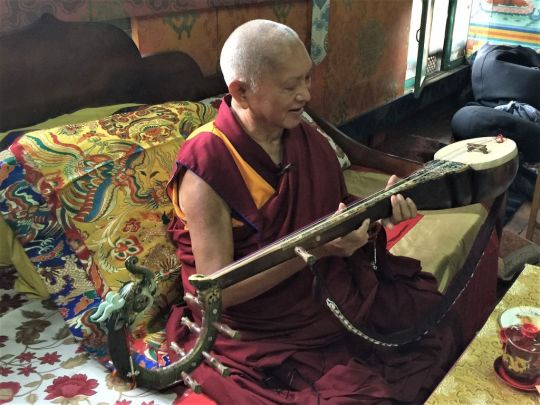
Lama Zopa Rinpoche examines an instrument while visiting a home where he was offered music, Bhutan, June 2016. Photo by Ven. Roger Kunsang.
Is it good to play music?
“Music can bring so much joy and happiness to people,” said Lama Zopa Rinpoche in 2005, “especially if it’s performed with a good motivation.”
In explaining how to play music in the most beneficial way, he added, “Also, if one is able to play purely to bring joy to others then one becomes less attached to music being ‘my music’. In that way, you don’t break vows or create negative karma. Also, you can visualize when you play music that you are offering clouds of music to all the buddhas and bodhisattvas of the ten directions who are in essence your own root guru.”
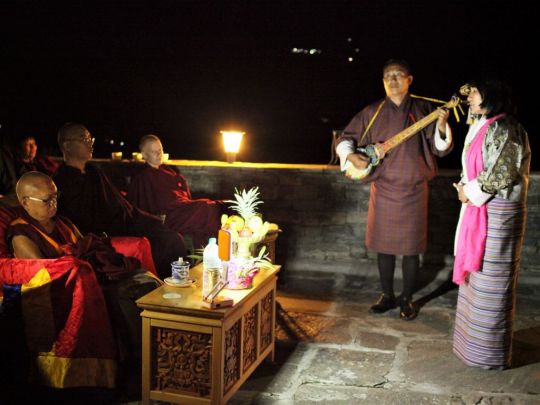
Singer Lhamo Dukpa offers a song to Lama Zopa Rinpoche, Bhutan, June 2016. Photo by Ven. Losang Sherab.
“In this way,” Rinpoche concluded, “you not only bring the music of bodhichitta to all the listeners, through your good motivation, but you also create vast amounts of merit by offering to your guru, who is in essence all of the buddhas.”
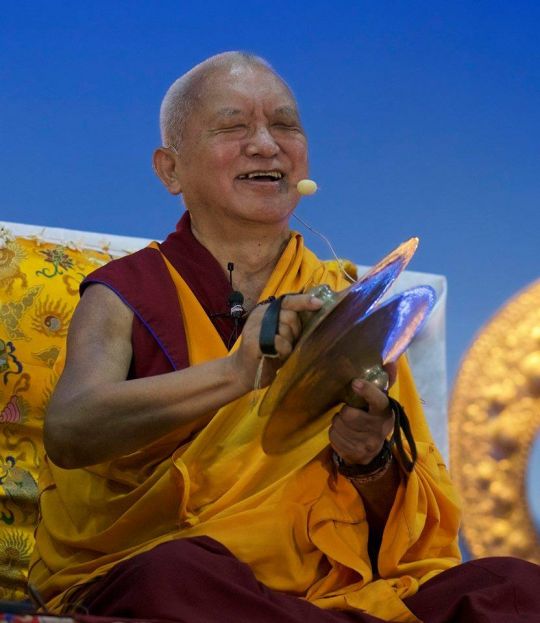
Lama Zopa Rinpoche enjoying playing the cymbals. Photo by Bill Kane.
Lama Zopa Rinpoche is the spiritual director of the Foundation for the Preservation of Mahayana Tradition (FPMT), a Tibetan Buddhist organization dedicated to the transmission of the Mahayana Buddhist tradition and values worldwide through teaching, meditation and community service.
- Tagged: lama zopa rinpoche, music, offerings
29

Lama Zopa Rinpoche visiting Khyongla Rato Rinpoche on Chokhor Duchen to respectfully make offerings to a beloved guru, New York, USA, August 2016. Photo by Ven. Lobsang Sherab.
A student wrote to Lama Zopa Rinpoche saying that he felt no one liked him. Rinpoche responded as follows.
When you had very negative thoughts before, thinking “nobody loves me, no one cares for me etc.,” you had so much unhappiness made by your own mind. You had that very unhappy mind for a long time. You have been thinking that the numberless buddhas and bodhisattvas do not love you; they don’t care for you, you are completely left out, and they let you suffer.
This way of thinking shows that you do not have renunciation of attachment, and also not an understanding of bodhichitta or emptiness.
Actually they cherish you one hundred thousand times more than the amount you love yourself. If they did not love you and cherish you, then you would not be a human being in this life. And even if you were, you would not have created all the virtues that you have, so much benefit for sentient beings would not have happened, and all this Dharma education you would not have. All of this, so much, so much, so much—you would not have.
It is important to understand the meditators, monks, nuns, and also lay people who are living in renunciation. Renunciation means to renounce attachment to this life, to future lives, to samsara. So they do not feel “nobody loves me.” They are so satisfied; they have inner peace and happiness. The stronger the renunciation, the more peace and happiness inside.
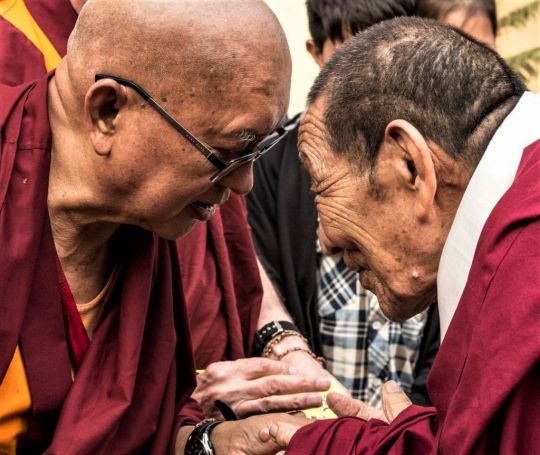
Lama Zopa Rinpoche greets Lama Monlam in Sarnath, India, January 2017. Photo by Paolo Regis.
Many people do not know this. They think that to be brought presents, flowers, and cakes makes them sooooooo happy.
But to generate the two bodhichittas, loving kindness, and compassion is not attachment. Like a mother, in just the way she cherishes her child, so the meditator cherishes numberless hell beings, preta beings, animals, human beings, suras, asuras and intermediate state beings, and all sentient beings—and then generates the precious thought to achieve full enlightenment for all these mother sentient beings.
From this there are skies of happiness and peace.
This is very important news. This can be very helpful for many other people, be they students or just ordinary people. The sadness, feeling alone, that no one loves you, this comes from attachment to this life. That’s why they need renunciation. This is the antidote that brings inner peace and happiness. It means the mind becoming pure Dharma.
The great ascetic Tsangpa Gyare [the founder of the Drukpa lineage] who is the savior of transmigratory beings, said, “Do not lose the auspicious connection with the valid perfect one. Even if you lose auspicious connections with everyone else, so be it. But if you lose the connection with the valid perfect one, then even if all transmigratory beings become your relatives—what is the use of that?
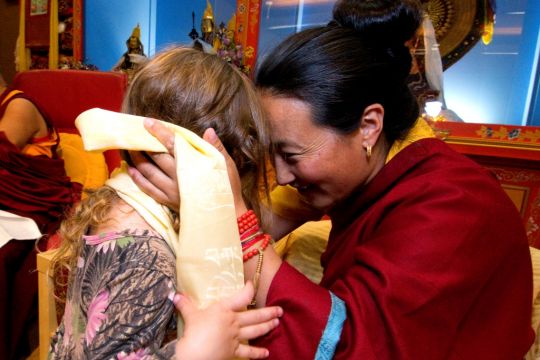
Khadro-la (Rangjung Neljorma Khadro Namsel Drönme) at Maitripa College, Portland, OR, US, June 2012. Photo by Marc Sakamoto.
Transcribed by Ven. Holly Ansett, Buddha Amitabha Pure Land, Washington, USA, November 2016. Lightly edited by Mandala.
Lama Zopa Rinpoche is the spiritual director of the Foundation for the Preservation of Mahayana Tradition (FPMT), a Tibetan Buddhist organization dedicated to the transmission of the Mahayana Buddhist tradition and values worldwide through teaching, meditation, and community service.
27
Lama Zopa Rinpoche on Art
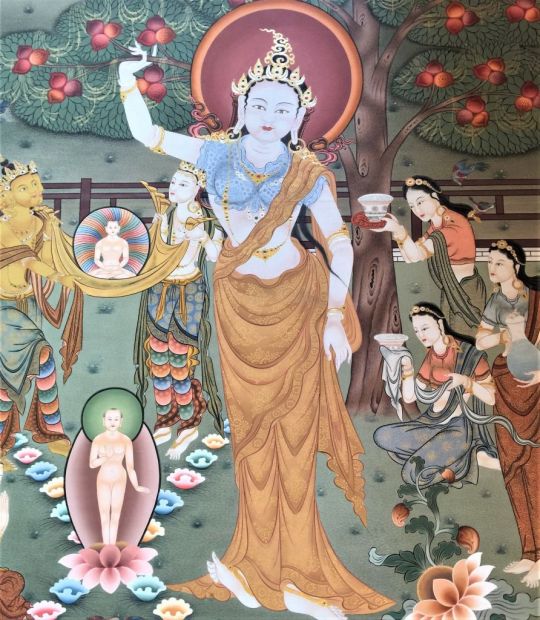
A wall painting of the Buddha’s mother inside the Buddha Dordenma statue, photographed during Lama Zopa Rinpoche’s visit to the site, Bhutan, June 2016. Photo by Ven. Roger Kunsang.
Can creating art be a Dharma practice?
Lama Zopa Rinpoche discussed this in 2005. Here is what he said:
“The first thing to think about,” explained Rinpoche, “is one’s attitude. The purpose of making the painting or of creating any work of art should only be to benefit others. One should do the artwork to pacify all one’s wrong concepts and disturbing emotional thoughts. While creating, one should keep a motivation of purifying negative karma and actualizing the good heart, loving kindness, bodhichitta, and, in fact, the whole path to enlightenment. By transforming one’s attitude into Dharma, one integrates one’s art with Dharma.”
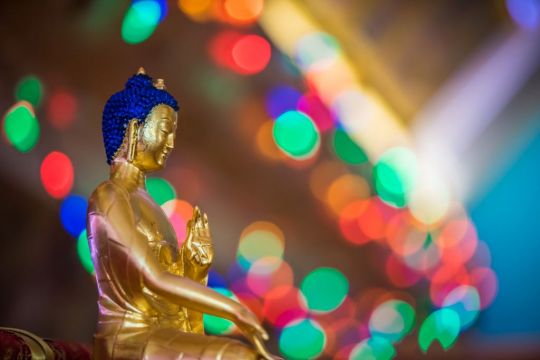
A photo of a Buddha statue with lights around it taken at Buddha Amitabha Pure Land. Photo by Chris Majors.
Rinpoche continued, “The second thing is the art itself. One should make objects that have a spiritual meaning. One can represent bodhisattvas’ life stories or the Buddha’s life story, showing how they practiced patience and perseverance for the happiness of other sentient beings. One could paint the life stories of great holy beings and present the ways they sacrificed their lives for other sentient beings by practicing renunciation, bodhichitta, and emptiness. One could show how they were always aware of karma. One could use art to show how happiness results from good actions and suffering from negative actions. [This] … is the integration of art with Dharma.”
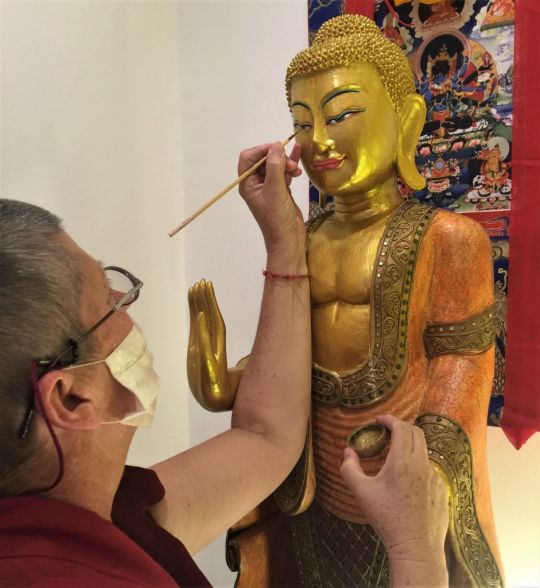
Ani Wy painting the face of the Buddha during a visit of Lama Zopa Rinpoche, Penang, Malaysia, April 2016. Photo by Ven. Roger Kunsang.
Rinpoche concluded, “At the beginning of every day, one should pray like this: Due to all my past and future merits, may anyone who sees, touches, or remembers this painting (or other object) never be born in the lower realms. May all disturbing spirit harms and obscurations be purified. May they achieve enlightenment as soon as possible by actualizing the whole path and may they have joy and happiness in their hearts.”
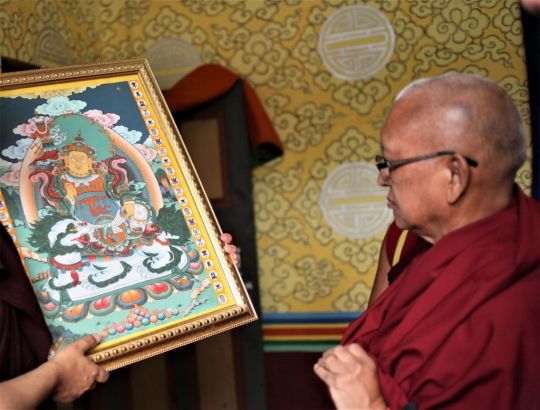
Lama Zopa Rinpoche examines a painting of Namtose at the National Museum of Bhutan, Paro, Bhutan, May 2016. Photo by Ven. Lobsang Sherab.
Find the original teaching here:
https://www.lamayeshe.com/advice/art-and-dharma
Lama Zopa Rinpoche is the spiritual director of the Foundation for the Preservation of Mahayana Tradition (FPMT), a Tibetan Buddhist organization dedicated to the transmission of the Mahayana Buddhist tradition and values worldwide through teaching, meditation and community service.
- Tagged: art, bodhichitta, lama zopa rinpoche
- Home
- News/Media
- Study & Practice
- About FPMT Education Services
- Latest News
- Programs
- New to Buddhism?
- Buddhist Mind Science: Activating Your Potential
- Heart Advice for Death and Dying
- Discovering Buddhism
- Living in the Path
- Exploring Buddhism
- FPMT Basic Program
- FPMT Masters Program
- FPMT In-Depth Meditation Training
- Maitripa College
- Lotsawa Rinchen Zangpo Translator Program
- Universal Education for Compassion & Wisdom
- Online Learning Center
- Prayers & Practice Materials
- Overview of Prayers & Practices
- Full Catalogue of Prayers & Practice Materials
- Explore Popular Topics
- Benefiting Animals
- Chenrezig Resources
- Death & Dying Resources
- Lama Chopa (Guru Puja)
- Lama Zopa Rinpoche: Compendium of Precious Instructions
- Lama Zopa Rinpoche: Life Practice Advice
- Lama Zopa Rinpoche Practice Series
- Lamrim Resources
- Mantras
- Prayer Book Updates
- Purification Practices
- Sutras
- Thought Transformation (Lojong)
- Audio Materials
- Dharma Dates – Tibetan Calendar
- Translation Services
- Publishing Services
- Teachings and Advice
- Find Teachings and Advice
- Lama Zopa Rinpoche Advice Page
- Lama Zopa Rinpoche: Compendium of Precious Instructions
- Lama Zopa Rinpoche Video Teachings
- ༧སྐྱབས་རྗེ་བཟོད་པ་རིན་པོ་ཆེ་མཆོག་ནས་སྩལ་བའི་བཀའ་སློབ་བརྙན་འཕྲིན།
- Podcasts
- Lama Yeshe Wisdom Archive
- Buddhism FAQ
- Dharma for Young People
- Resources on Holy Objects
- Ways to Offer Support
- Centers
- Affiliates Area
- Teachers
- Projects
- Charitable Projects
- Make a Donation
- Applying for Grants
- News about Projects
- Other Projects within FPMT
- Support International Office
- Projects Photo Galleries
- Give Where Most Needed
- FPMT
- Shop
Translate*
*powered by Google TranslateTranslation of pages on fpmt.org is performed by Google Translate, a third party service which FPMT has no control over. The service provides automated computer translations that are only an approximation of the websites' original content. The translations should not be considered exact and only used as a rough guide.Basically, the human mind is mostly unconscious, ignorant, and gets so preoccupied with new experiences, that it forgets the old ones. Review the past month: exactly what happened, precisely what feelings did you have, every day? You can’t remember, can you? But if you practice this slowly, slowly, continuously checking within your mind, eventually, you’ll be able to remember more and more of your previous experiences.









